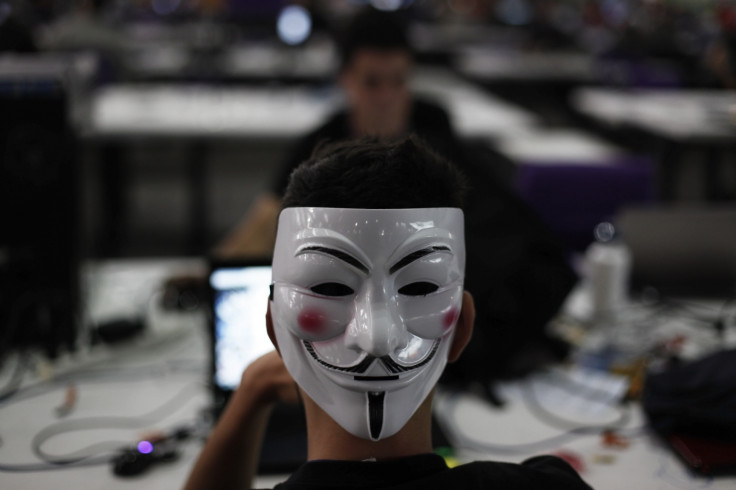Evolution of Anonymous: The rise of the hacktivists and the power struggles they face
Hacktivist collective Anonymous has been in the spotlight for bringing down websites of major financial institutions via OpIcarus – the month-long campaign targeting international banks for alleged corrupt practices. IBTimes UK spoke to members of Anonymous and Ghost Squad Hackers (GSH) to understand the social dynamics of the group.
It seems like the collective is indeed facing a supremacy battle and this article explores how they work in tandem despite the power struggle, which can be noticed with the success of their recent operation.

The evolution of Anonymous
ESET senior security researcher Stephan Cobb pointed out that Anonymous's evolution had been the focus of studies of various scholars. "Academics in several fields have studied Anonymous, although the longer research cycle in academia means some of these studies take their cues from earlier periods of activity such as the 2008 attacks on Scientology, the 2010 support of Wikileaks, and the 2011 support of Occupy Wall Street. It is clear that Anonymous has been hard to analyze and categorize due to its apparent lack of centralized command and control," he said.
Cobb cited an article by professor Justus Uitermark of the University of Amsterdam, who has studied Anonymous at length in the past. The article analyses the "dynamics of power" within the hacktivist collective. "While participants in Anonymous radically reject hierarchy and leadership, dominant groups emerged at various points in the movement's evolution," Uitermark said.
Uitermark also highlighted, "While the movement's self-representations convey important dimensions of Anonymous' evolution, Anons are obviously not like bees in a hive or birds in a flock. Far from a supercreature that is effortlessly construed out of genetically pre-programmed units, like a hive or a flock, Anonymous is the emergent and contested outcome of Anons who work with and against each other."
Explaining the power struggle within the hacktivist collective, Uitermark said, "In the belly of the beast – the Internet settings where Anons congregate – we do not see the harmonious collaboration of people who instinctively know their place within the collective (like birds or bees would) but an incessant struggle.

Exactly because the movement lacks generally accepted procedures for making decisions and allocating power, there is a constant struggle to define what Anonymous is and how it should operate. Any hierarchy is thus fraught with tension and subject to challenges. While movements are unstable due to their participants' constantly changing connections, they occasionally undergo sudden changes that complexity researchers call 'phase transitions' or 'saltations'."
Cobb remarked that he was in agreement with Uitermark's analysis of the social structure of Anonymous and said, "I am comfortable with his analysis, which explains Anonymous' 'changing repertoires and goals with reference to underlying network mechanisms' and 'captures these varied connection patterns as configurations of power, focusing in particular on the degree to which logistic, symbolic, and communicative power is concentrated in one among many clusters'.
Rather than a hierarch, he sees the movement consisting of 'multiple and relatively autonomous clusters. However, some clusters may come to play a much more prominent role than others'. He calls for more research into the 'underlying mechanisms and patterns of power concentration and power diffusion' and considers it 'of crucial importance in understanding Anonymous and in the study of movement dynamics in general'."
Uitermark also noted that Anonymous has once undergone something similar to a civil war after gaining notoriety from their activities as part of the Occupy movement. The FBI launched a crackdown on Anonymous leading to several arrests of high profile members, thanks to some anons themselves who turned informants due to a change of direction in their beliefs and principles. However, Uitermark highlighted, that despite the crackdown, the group continued to function.
"Anonymous lived on, not so much as an internally cohesive social movement, but as a set of symbols and communication channels that are appropriated by a range of different groups for a range of different purposes. The masks that activists donned at the protests against Scientology have now become ubiquitous as they show up in demonstrations from Brazil to Hong Kong and from Turkey to the United States. The infrastructure that Anonymous has built up over the last years is now used to communicate about a range of protests in different countries. Rather than pushing for change itself, Anonymous accelerates the diffusion of protests that are initiated by others," he said.

Calling for further investigation into the underlying power mechanisms within Anonymous, Uitermark concluded: "Analyzing Anonymous is hard not only for journalists and the public, but also for social movement theorists. Attempting to understand Anonymous requires a rethinking of what movements are and how we can understand them. Participants are perennially engaged in struggles to settle what is intrinsically unstable: what the movement is, what it stands for, and who its legitimate spokespersons are."
In other words, if Anonymous is indeed experiencing a power struggle within its various subgroups, it is perhaps no more than history repeating itself. However, as before, it is likely that the hacktivist collective will persist and, as previously cautioned by one of its members, Voice, the group is setting its sights on other targets and preparing to launch more campaigns in the coming months. "We are trying to do good things with Anonymous and sadly the name has been abused before, but we are coming correct now. 2016 will be a year with many great Anonymous Operations," he remarked.
Meanwhile, GSH has launched a new independent operation called OpSilence which is aimed at targeting mainstream media in a month long attack, in retaliation for allegedly ignoring or downplaying the crisis in Palestine.
Mail servers of both targets #OpSilence FOX and CNNhttps://t.co/HY2xcXuheWhttps://t.co/WKUCFUBrQg Next Target NBC pic.twitter.com/qlyGWHDDuW
— Ghost Squad Hackers (@GhostSquadHack) June 2, 2016
According to Voice, Anonymous has no interest in OpSilience and intends not to participate as it goes against the group's principles of attacking the press. He stressed, "Anonymous doesn't attack the mainstream press. We may do a little knock knock to get your attention, but we would never go to war with the press."
ALL OF THE MEDIA WHO REPORTS ON OUR ATTACKS #OPSILENCE IS GSH OP NOT ANONOP WE ARE NOT AND I REPEAT NOT ANONYMOUS
— s1ege (@s1ege_) June 1, 2016
GSH's S1ege and Gh0s7 said that they had already shut down severs of CNN and Fox News, however this has not been independently verified.
Editor's note: This article is not intended to credit or discredit anyone. It is an attempt by IBTimes to look into the social and cultural dynamics of the hacktivist collective – Anonymous.
© Copyright IBTimes 2025. All rights reserved.






















